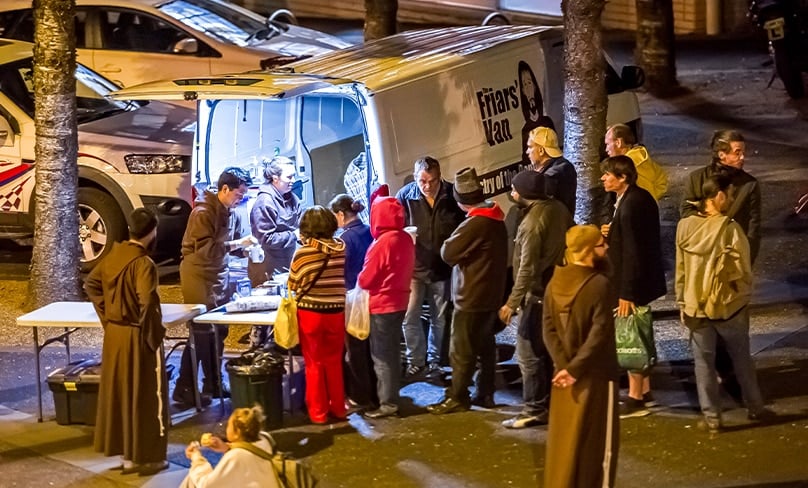
For several years, I volunteered with the Capuchin Franciscan Friars’ coffee van ministry each Friday and Saturday night. A small group of lay faithful would get together with the Friars outside the PCYC at Woolloomooloo to offer hot drinks, chocolates, and friendly conversation to the many rough sleepers in the area.
I had many wonderful experiences during this ministry, one of which I’ll never forget.
The ministry is just couple of streets over from Oxford Street, and so there was always a sizeable number of Sydney’s LGBT community coming for a coffee and a chat.
It was a very cold and rainy winter night and a transwoman lining up for a coffee struck up a conversation with one of the female volunteers about her ankle-length skirt. “Where did you get it?” she asked. “I can never seem to find skirts long enough for me.”
How did the volunteer respond, do you think? If you believe the rhetoric around the religious freedom debate, you might assume she sent the transwoman packing until she repented of her sin.
Perhaps if we had a Religious Discrimination Bill she would have had the right to serve the transwoman, while chastising her throughout, telling her that gender dysphoria comes from the devil and that she would go to hell.
“It’s not that the volunteer was affirming the change of gender identity … She responded in the same way that she would to anyone else, offering charity and kindness when she had the ability to do so.”
What actually happened was that the volunteer excused herself, stepped behind the coffee van and removed the skirt. She was wearing tights underneath.
She folded it neatly, placed it in a plastic bag and handed it to the transwoman. “I bought it last season,” she said. “You probably won’t find it if you went looking for it.”
It’s not that the volunteer was affirming the change of gender identity or showing she disagreed with the Church’s teaching on what it means to be male or female. She responded in the same way that she would to anyone else, offering charity and kindness when she had the ability to do so.
Although it stayed in my mind, there wasn’t anything particularly remarkable about what the volunteer did that night. It is pretty much what Catholics do.
Much as we are accused of wanting the right to deny service to or condemn those with whom we disagree, it’s not our style. For the most part, Catholics don’t engage in the same type of cancel culture that is the favourite sport of so many opposed to religion’s place in the public square.

I would actually go further and suggest that the Catholic Church is one of the most inclusive institutions in the country.
Look at Australia’s first saint, Mary of the Cross Mackillop. She dedicated her life to the education of the poor, particularly those in rural and remote areas.
Her order founded orphanages and aged care homes too, and has ministered to refugees, victims of trafficking and Indigenous Australians for a century.
In many ways – and certainly by world standards – Mary Mackillop’s story is also unremarkable. Establishing schools and care facilities for the most vulnerable is what Catholics have done for centuries in every country the church operates.
The Sisters of Charity are another example. They opened Australia’s first ward for HIV/AIDS patients at St Vincent’s Hospital in 1984, when so many were too scared of the AIDS virus to care for those suffering from it.
“Our churches, schools, hospitals, aged care facilities and welfare organisations serve people of all faiths and none, many if not most of whom do not agree with the Church’s teaching on moral issues.”
At the same time, the Catholic Women’s League in Sydney bought a bus to take AIDS patients to get medical care. Some might think it surprising that Catholic nuns and laywomen were the first responders to the AIDS epidemic. But it’s just what Catholics do when given the freedom to speak and act in accordance with their faith.
Our churches, schools, hospitals, aged care facilities and welfare organisations serve people of all faiths and none, many if not most of whom do not agree with the Church’s teaching on moral issues.
These organisations – with a few notable exceptions – are able to undertake this service without compromising their Catholic ethos.
It is very sad that the modus operandi of Catholics – in Mary Mackillop words, “Never see a need without doing anything about it” – has been lost in the politicking around this bill.
Now that it has been shelved and there is time for some serious reflection, I hope that we can rediscover that rather than putting the marginalised at risk of further discrimination, protecting religious freedom benefits everyone, particularly those most on the margins.
Related Articles:
